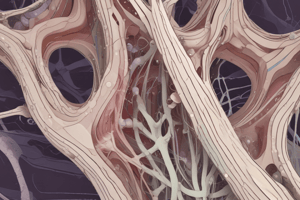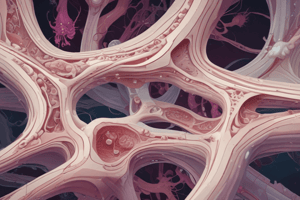Podcast
Questions and Answers
What is the primary component of the capsular matrix surrounding chondrocytes?
What is the primary component of the capsular matrix surrounding chondrocytes?
- Type IX collagen fibrils
- Type I collagen fibrils
- Type VI collagen fibrils (correct)
- Type II collagen fibrils
What is the function of hyaline cartilage in the developing fetus?
What is the function of hyaline cartilage in the developing fetus?
- It provides a model for the developing muscular system.
- It provides a model for the developing circulatory system.
- It provides a model for the developing skeleton. (correct)
- It provides a model for the developing nervous system.
What is the characteristic of chondrocytes in the Zone of Proliferating Cartilage?
What is the characteristic of chondrocytes in the Zone of Proliferating Cartilage?
- They are arranged in rows, parallel to the long axis of the specimen. (correct)
- They are cuboidal in shape.
- They are spherical in shape.
- They are haphazard and have no definite arrangement.
What is the characteristic of the territorial matrix?
What is the characteristic of the territorial matrix?
What is the process by which bones develop from hyaline cartilage?
What is the process by which bones develop from hyaline cartilage?
What is the characteristic of the Zone of Maturation and Hypertrophy?
What is the characteristic of the Zone of Maturation and Hypertrophy?
What is the characteristic of the Zone of Calcification?
What is the characteristic of the Zone of Calcification?
What occurs in the Zone of Developing Trabeculae?
What occurs in the Zone of Developing Trabeculae?
What is unique about the matrix of elastic cartilage compared to hyaline cartilage?
What is unique about the matrix of elastic cartilage compared to hyaline cartilage?
What type of collagen fibrils are present in the ECM of fibrocartilage?
What type of collagen fibrils are present in the ECM of fibrocartilage?
What is the function of the epiphyseal growth plates?
What is the function of the epiphyseal growth plates?
Where is hyaline cartilage typically found in a fully grown individual?
Where is hyaline cartilage typically found in a fully grown individual?
What is the main component of the ECM in elastic cartilage that distinguishes it from hyaline cartilage?
What is the main component of the ECM in elastic cartilage that distinguishes it from hyaline cartilage?
What is fibrocartilage composed of?
What is fibrocartilage composed of?
Where is elastic cartilage typically found?
Where is elastic cartilage typically found?
What is the function of the residual cartilage at the proximal and distal end of the bone?
What is the function of the residual cartilage at the proximal and distal end of the bone?
Flashcards are hidden until you start studying
Study Notes
Regions of Hyaline Cartilage Matrix
- Capsular (Pericellular) matrix: a ring of densely staining matrix around the chondrocyte, containing the highest concentration of sulfated proteoglycans, hyaluronan, biglycans, and multiadhesive glycoproteins.
- Territorial matrix: a region surrounding the isogenous group, containing a randomly arranged network of type II collagen fibrils with smaller quantities of type IX collagen.
- Interterritorial matrix: a region surrounding the territorial matrix, occupying the space between groups of chondrocytes.
Zones of Hyaline Cartilage Development
- Zone of Resting Cartilage: chondrocytes are haphazard and have no definite arrangement.
- Zone of Proliferating Cartilage: chondrocytes are arranged in rows, parallel to the long axis of the specimen.
- Zone of Maturation and Hypertrophy: chondrocytes and lacunae enlarge to a cuboidal shape.
- Zone of Calcification: matrix appears darker staining, and lacunae have opened up.
- Zone of Developing Trabeculae: osteoblasts gather on the surface of cartilage plates or bone trabeculae.
- Zone of Resorption: characterized by the presence of osteoclasts.
Hyaline Cartilage Development and Function
- Hyaline cartilage provides a model for the developing skeleton of the fetus.
- It is the precursor of bones that develop by the process of endochondral ossification.
- During development, most cartilage is replaced by bone, leaving residual cartilage at growth sites (epiphyseal growth plates).
- In adults, cartilage remnants are found in articular surfaces of joints, rib cage, trachea, bronchi, larynx, and nose.
Elastic Cartilage
- Elastic cartilage is distinguished by the presence of elastin in the cartilage matrix.
- It contains a dense network of branching and anastomosing elastic fibers and interconnecting sheets of elastic material.
- Found in the external ear, walls of the external acoustic meatus, auditory (Eustachian) tube, and epiglottis of the larynx.
- Unlike hyaline cartilage, the matrix of elastic cartilage does not calcify during aging.
Fibrocartilage
- Fibrocartilage is a combination of dense regular connective tissue and hyaline cartilage.
- Typically present in intervertebral discs, pubic symphysis, insertion of tendons, and structures within certain joints.
- The ECM of fibrocartilage contains varying amounts of both Type I and Type II collagen fibrils.
- In addition, ground substance contains larger amounts of versican (a proteoglycan monomer secreted by fibroblasts) than aggrecan (produced by chondrocytes) molecules.
Studying That Suits You
Use AI to generate personalized quizzes and flashcards to suit your learning preferences.




